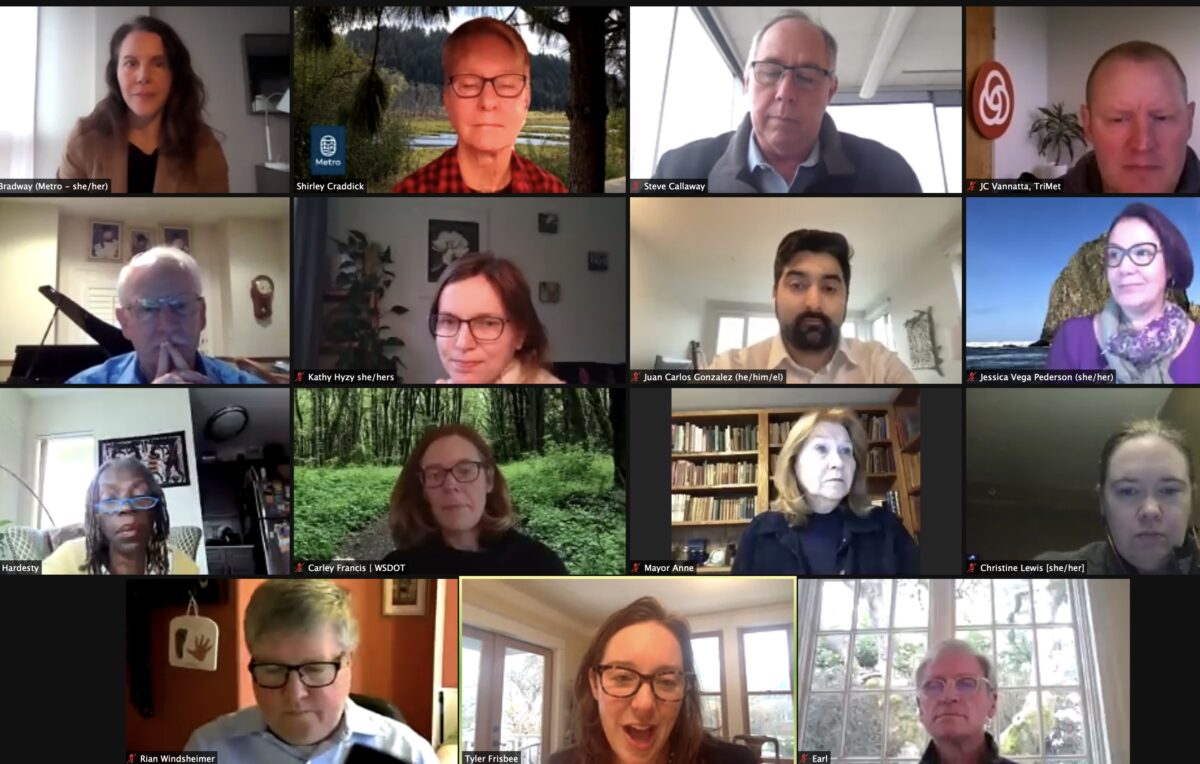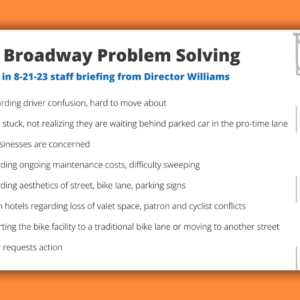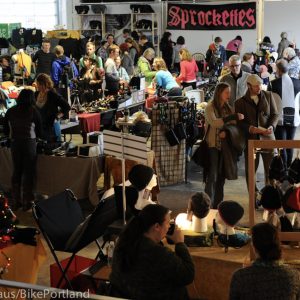
Oregon Congressman Earl Blumenauer dropped into a meeting of the Joint Policy Advisory Committee on Transportation (JPACT) Thursday morning to share an overview of what to expect from the Biden Administration.
“If there’s an opportunity to jumpstart some of the regional investments, I think we ought to fully explore and work together to make that successful.”
JPACT is an influential body convened by Metro that has several mayors and other high-profile elected officials and transportation leaders from around the region on its roster list. The regional manager of ODOT is a member. So is new PBOT Commissioner Jo Ann Hardesty.
“I was disappointed with the regional response to the ballot measure,” Blumenauer said at the outset of his remarks. “But it’s a process for us to step back, reflect and learn.”
Blumenauer set the table for his address by listing the myriad crises facing America and said Congress is at its most divisive state “since the Civil War”. The good news now is that we finally have a “grown-up” in the White House, who is “dedicated to governance” he said, in reference to President Joe Biden.
As for the prospects of a transportation infrastructure bill on Capitol Hill in the near future, Blumenauer sounded very positive. While votes in the House and Senate might be tight on most issues these days, Blumenauer said he’s hopeful transportation will be different. “I hope that the broad recognition that investing, rebuilding and renewing America is something that doesn’t have to be partisan.”
Advertisement
Whatever happens, Blumenauer made it clear Oregon is poised to have an influence and reap benefits. Blumenauer’s long-time colleague and fellow Oregonian, Representative Peter DeFazio is chair of the all-important House Transportation and Infrastructure Committee. And Oregon Senator Ron Wyden is now chair of the Senate Finance Committee. This means Oregonians are in key transportation policy and purse-string positions.
“We’re in a great position, having two key people on two key committees, moving this forward,” Blumenauer said.
Blumenauer also shared insights on how Congress will likely pay for new transportation investments. He said the chances of the federal government supporting a gas tax increase or tolling is very unlikely. Blumenauer referred to a gas tax increase as a “dead end for us” and that he doesn’t want to spend time fighting for something that has no chance of passing. The one revenue method he prefers is something Oregon happens to have been a pioneer on: A road user charge.
Blumenauer feels a road user charge can be more precisely targeted to avoid inequities and can “manage transportation behavior in a more granular fashion.” He spoke of a potential “grand bargain” where road user fees would be “concentrated on those who are creating the problem and the expensive solutions” and rural and small town residents would get a break.
At the end of his remarks, Blumenauer told the assembled leaders that Congressional earmarks are on their way back. The idea of earmarks — where members of Congress get funding for pet projects back in their district — ended several years ago after the failure of high-profile bridge project in Alaska made them politically toxic. Blumenauer said this morning they’ll return under a new name: “congressionally directed spending.”
Blumenauer said the new program will have much higher standards of transparency to “make sure there is no question of abuse or misappropriation”.
Bringing it back to Metro’s regional investment measure voters rejected in November, Blumenauer said, “If there’s an opportunity to jumpstart some of the regional investments, I think we ought to fully explore and work together to make that successful.”
— Jonathan Maus: (503) 706-8804, @jonathan_maus on Twitter and jonathan@bikeportland.org
— Get our headlines delivered to your inbox.
— Support this independent community media outlet with a one-time contribution or monthly subscription.







Thanks for reading.
BikePortland has served this community with independent community journalism since 2005. We rely on subscriptions from readers like you to survive. Your financial support is vital in keeping this valuable resource alive and well.
Please subscribe today to strengthen and expand our work.
Blumenauer bragging about the return of earmarks, one of the least transparent and democratic aspects of the legislative system. The swamp deepens.
Look on the bright side, now we can build the “DeFazio Memorial Elevated Bicycle Expressway to Nowhere”, $1 Billion in steaming pulled-pork. Who’s hungry?
LOL I do wonder what kind of edifice will be erected in his honor once he retires. I mean Eugene worships him so much that I can see the Federal Courthouse being renamed.. Oh wait, that is the Feds. Maybe the City Hall, which was torn down many years ago, and never replaced haha I got it: the Peter DeFazio Country Fair!
Did the article not say that they have altered the process to make it more transparent? Am I missing something?
And if earmarks bug you that much, you should check out the process for DOD/military spending. Waaaay swampier.
Well, you’re right on that one. Two family members had long careers in fighter aircraft sales, one in the U.S., the other selling to Asian countries. The stories they could tell.
Earmarks are awesome! I’m so glad to hear they’re coming back!
There is copious research out there showing that earmarks and other contributors to the power of parties (as opposed to of factions/special interests) are extraordinarily important to legislative compromise (both between and within parties). In the American system, since we have so many “veto points”, that means they’re extraordinarily important to passing much significant legislation at all.
https://www.brookings.edu/blog/fixgov/2018/12/27/congress-in-2019-why-the-first-branch-should-bring-back-earmarks/
https://yalebooks.yale.edu/book/9780300232752/responsible-parties
Oh wow, here comes the pork. Whenever that happens it enriches the few and helps the fewest citizens.
Can’t say I’m excited for this.
Bringing back pork. 🙁 I’m disappointed in the Democrats. Despite what Blumenauer says, I have serious doubts they will be on the “up and up” in this unfortunate reincarnation.
Id rather have pork than nothing, one of the roles of a member of congress is to bring home the bacon to their district. Talk swamp, but former president was backroom taking donations for deals that eventually benefited him and his children and nothing was built for the people. Former president was supposed to be the best at the art of the deal and was gonna give us a big ole infrastructure package. He had all 3 bodies of the govt to make it happen but didn’t.
Now that the shoe is on the other foot, pork is suddenly a bad thing. You may want out of Portland, but are you SURE you want to move to Texas?
“Pork” is always a bad thing. The Republicans got rid of earmarks in 2011. Obama continued this positive development. Unfortunately, we’re now back to this opaque and undemocratic approach to government spending.
The replacements for ear marks weren’t any more transparent or democratic. For instance, lots of money was funneled into the BUILD grant program . While there is a competitive process, look at the distribution of funding. Urban areas used to receive a lot of that money back when it was called TIGER. The vast majority of the BUILD grants went to more rural areas. Why? Because the Trump administration was supported more by rural voters. You could probably make the same argument about Obama and TIGER.
Earmarks aren’t perfect, but the ‘competitive’ grant processes that replaced them for infrastructure spending weren’t really any better.
The money gets allocated by someone. If there are no earmarks, it gets allocated by the executive branch. Which is another political body, which can allocate the money to its special interests, as Hippodamus pointed out.
Earmarks are essential for passing significant legislation at a reasonable pace. We need a lot of significant legislation. We should celebrate that Blumenauer says they’re coming back, and even more when they actually come back!
Keep in mind a “road user charge” is alternative to the gas tax that just taxes everyone that drives a car a flat fee per mile driven (1.8 cents per mile driven in OR). This incentivizes larger vehicles since instead of paying more gas taxes when you drive a giant SUV that gets 10 miles per gallon, you pay the same amount as someone that drives a Prius that gets 50+ miles per gallon. Those giant SUVs are the vehicles that are killing bicycles and pedestrians at an ever increasing rate and spewing out more C02 and pollutants. Any “road user charge” needs to be adjusted so that if you drive some monster vehicle that is more likely to kill a vulnerable road user that you pay more. How about every SUV and truck paying 5 cents per mile and smaller efficient vehicles pay the 1.8 cents per mile?
User fees are a way to capture more of the wear and tear of delivery vehicles we are all dependent upon, even if you don’t drive or use an “efficient” car. As we are all killing local commerce by e-commerce, we now need to adjust how we collect taxes for the roads we are dependent on, even if we aren’t actually using them with our own bodies, just virtually.
There are plenty of deliveries from local businesses. I suspect what you are looking for is a way to tax the big e-commerce deliveries without impacting the small local folks. Income taxes are a great way to fund government in a progressive way that does not increase the cost of basics like food and medicine. Higher registration fees would be another good way to fund roads and the fees could be based on vehicle value or use which could make it a “progressive tax”. Personally I would like to see a doubling of gas taxes just like I would like to see a doubling of cigarette taxes but I’m sure if Blumenauer says that increased gas taxes are a non-starter he is right even if I don’t like it.
Don’t get me started on automobile insurance. I make a concerted effort to drive as little as possible, somewhere around 4000 miles a year Even though I have a great insurance rate, I pay over 15 cents a mile just for my premium. At the current price of gas, that is way more than I pay for gas. Just writing this makes me question my sanity for even owning a car. I have flirted with the idea of not owning a car in Bend, but trying to access skiing, hiking, and mountain biking without one is a real logistical nightmare.
I think it’s time for a 3rd party. Need to unite fiscally responsible Democrats and socially progressive Republicans. Ending “pork” and getting rid of “dark money” and big contributors to election campaigns would be part of their platform.
I couldn’t agree more. It is so frustrating to be fiscally minded but also want to see social progress made. I think that all parties would be more responsible if their voter base had the option of a step between Democrats and Republicans. Better yet, both parties wouldn’t feel so pressured to include their “radical” ends of the political spectrum just to overcome their opponents.
Democrats are great for the economy and for the governments wallet. Take a look at budget data rather than what Fox News tells you. The last president to balance a budget was a Democrat. The last two republicans have blown up the deficit.
There is also no such thing as a socially progressive republican.
Third parties are a non-starter so long as we use plurality voting.
Fortunately, public awareness that plurality isn’t the only way to vote is expanding, with several areas and even a couple of states adopting alternatives. The best alternative, STAR voting, is coming up right here in Oregon, and if you’d like to see third parties become a possibility and are looking for somewhere to put in some advocacy hours to make that happen there’s no better time than now: https://www.starvoting.us/
I’m torn. Without earmarks, there was little to be loyal to but party, which helped keep Republicans in lockstep. That amplified partisanship, and proved a destructive force overall. We badly need to tone down our political tribalism.
On the other hand, I think most people regard earmarks as corruption-adjacent, and to have restoration of the practice be one of the first things Democrats did once they took power doesn’t look good.
Earmarks wouldn’t bother me so much, if some of them weren’t for just absurd projects…freeways to nowhere, long-empty airports, and I seem to recall an Alaskan porkie that was the grandad of them all.
Earmarks have gotten a bad name due to some unscrupulous committee chairman who have abused them but they are not inherently a bad thing. It’s a way for Cities/ metro areas, etc to advocate for specific high priorities that may not be the priority of the state DOT where typical transportation money funnels through. When I worked on capitol hill and handled earmark request applications, there was an application process with scoring criteria measuring many things (climate impacts, ability to leverage other local or private dollars, the number of partnering organizations or agencies, etc). The most competitive applications were ones where was broad support among many organizations/agencies. Requests were submitted with letters of support. In fact, TREC – the transportation research center at PSU started as a congressional earmark.
In theory, Metro, the various Cities and getting together coalition could submit the east portland corridor projects from the metro bond measure for an earmark. It would be tough to cobble together that size of earmark from the Oregon legislature, since lawmakers outside of the Portland region don’t want to fund that. But something like that could make an attractive project if there is strong regional support. Anyway- this sort of thing is more fair than the way federal transportation dollars are currently distributed by formula funds that advantage states with a ton of existing highway miles (reasons rural states end up getting way more money back per dollar sent to DC).